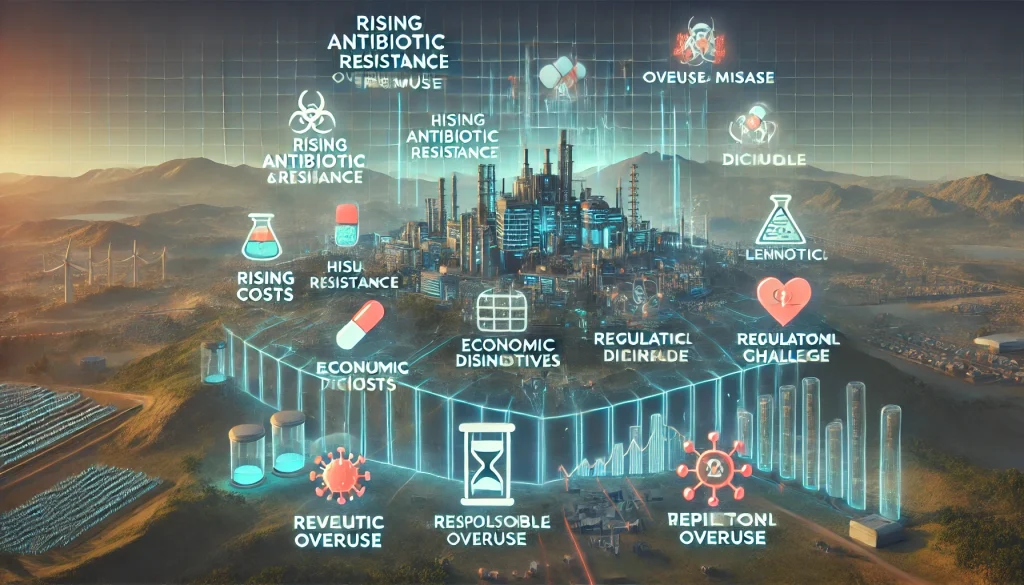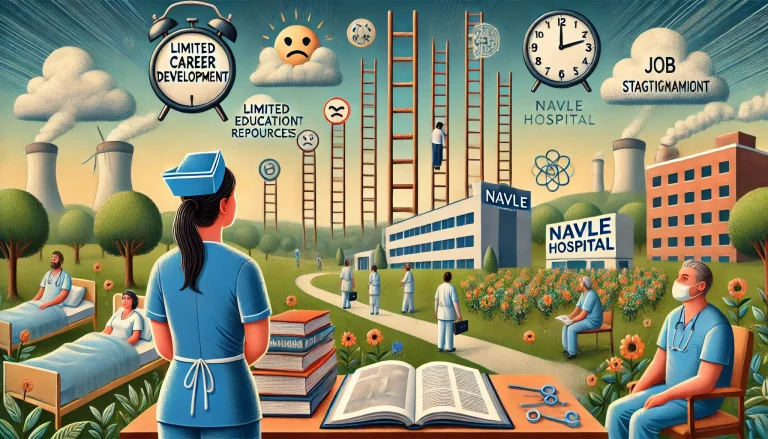Problem Statement
Pharmaceutical manufacturers face a critical challenge with antibiotic resistance, where bacteria evolve to resist existing drugs, rendering many treatments ineffective. This growing problem is a significant public health threat, as it leads to infections that are harder to treat, resulting in increased mortality, longer hospital stays, and higher medical costs. Antibiotic resistance is exacerbated by the overuse and misuse of antibiotics in both human and veterinary medicine. Patients often receive antibiotics for conditions where they are not needed, such as viral infections, and improper use, such as not completing prescribed courses, further contributes to resistance. In veterinary medicine, antibiotics are frequently used to promote growth in livestock, further accelerating resistance.
The pharmaceutical industry faces immense pressure to innovate and develop new antibiotics that can effectively combat resistant bacteria. However, this is easier said than done. Developing new antibiotics is a complex, time-consuming, and costly process. It involves significant research and development (R&D) investments, rigorous clinical trials, and navigating stringent regulatory requirements. Moreover, the economic model for antibiotics is challenging; these drugs are typically used for short durations and are often reserved for the most severe cases, making them less profitable than treatments for chronic conditions. This economic disincentive has led many pharmaceutical companies to deprioritize antibiotic development, further compounding the issue. Addressing antibiotic resistance requires a multi-faceted approach that includes not only the development of new drugs but also the implementation of stewardship programs, public awareness campaigns, and regulatory incentives to encourage innovation and responsible antibiotic use.
Pain Points
- Rising Antibiotic Resistance: Bacteria evolving to resist current antibiotics, leading to treatment failures.
- Overuse and Misuse: Antibiotics being used inappropriately in human and veterinary medicine, accelerating resistance.
- High R&D Costs: Significant investment required for developing new antibiotics.
- Economic Disincentives: Lack of profitability in antibiotic development compared to other drugs.
- Regulatory Hurdles: Complex and stringent regulatory requirements for new antibiotic approval.
- Limited Pipeline: A shrinking number of new antibiotics being developed and brought to market.
- Global Health Impact: Increasing global health burden due to resistant infections.
- Stewardship Challenges: Difficulty in implementing and enforcing antibiotic stewardship programs.
- Public Awareness: Low public awareness about the dangers of antibiotic misuse and resistance.
- Veterinary Overuse: Widespread use of antibiotics in livestock contributing to resistance.

Future Vision
Our platform envisions a future where pharmaceutical manufacturers can effectively combat antibiotic resistance through innovation, collaboration, and sustainable practices. By leveraging advanced technologies such as AI, machine learning, and big data analytics, the platform will support the accelerated discovery and development of new antibiotics. AI-driven drug discovery tools will identify promising compounds faster and more efficiently, reducing the time and cost associated with traditional R&D methods. The platform will also facilitate collaboration between pharmaceutical companies, academic institutions, and public health organizations to share data, research findings, and best practices. To address the economic challenges, the platform will promote alternative business models, such as subscription-based approaches, where healthcare systems pay for access to antibiotics rather than per use, ensuring a steady revenue stream for manufacturers.
Additionally, the platform will support the implementation of robust antibiotic stewardship programs to ensure that new and existing antibiotics are used responsibly, preserving their effectiveness. Public awareness campaigns will be integrated into the platform, educating both healthcare professionals and the general public about the dangers of antibiotic misuse and the importance of adherence to prescribed treatments. By creating a holistic ecosystem that supports innovation, responsible use, and sustainable economic models, our platform will help pharmaceutical manufacturers stay ahead in the fight against antibiotic resistance, ultimately improving global health outcomes.
Use Cases
- AI-Driven Drug Discovery: Accelerating the identification of new antibiotic compounds.
- Collaborative Research Networks: Facilitating data sharing and collaboration between pharma companies and academic institutions.
- Alternative Business Models: Implementing subscription-based approaches to antibiotic access.
- Antibiotic Stewardship Programs: Supporting the responsible use of antibiotics in healthcare settings.
- Regulatory Support Tools: Assisting manufacturers in navigating complex regulatory processes.
- Public Awareness Campaigns: Educating the public about antibiotic resistance and proper usage.
- Global Health Partnerships: Collaborating with global health organizations to combat resistance worldwide.
- Veterinary Antibiotic Management: Promoting responsible use of antibiotics in livestock.
- Real-Time Resistance Monitoring: Using big data analytics to track and predict antibiotic resistance trends.
- Economic Incentive Programs: Developing incentives for companies to invest in antibiotic research and development.
Target Users and Stakeholders
- User: Pharmaceutical Researchers, Regulatory Affairs Teams, and Public Health Officials
- Age Group: 30-60 years
- Gender: M/F
- Usage Pattern: Regular usage for managing antibiotic development, regulatory compliance, and public health initiatives
- Benefit: Accelerated drug discovery, improved regulatory navigation, and effective antibiotic stewardship
- Stakeholders:
- Pharmaceutical Companies: Businesses involved in the development and production of antibiotics
- Academic Institutions: Universities and research centers conducting antibiotic research
- Public Health Organizations: Government agencies and NGOs focused on combating antibiotic resistance
- Veterinary Medicine: Entities involved in the use and regulation of antibiotics in livestock
- Healthcare Providers: Hospitals and clinics responsible for prescribing and administering antibiotics
Key Competition
- GSK: Active in the research and development of new antibiotics.
- Pfizer: Invests in antibiotic research and global health initiatives.
- Merck & Co.: Develops and markets antibiotics and supports stewardship programs.
- Roche: Involved in the discovery and development of new antibiotic treatments.
- Novartis: Focuses on antibiotic innovation and public health partnerships.
Products/Services
- GSK Antibiotics: Research and development of new antibiotic therapies.
- Pfizer Global Health: Initiatives to combat antibiotic resistance through research and education.
- Merck Stewardship Programs: Promoting responsible antibiotic use in healthcare.
- Roche Antibiotic Innovation: Discovery and development of new antibiotics.
- Novartis Public Health Partnerships: Collaborations to address global health challenges related to antibiotic resistance.
Active Startups
- Vedanta Biosciences: Focused on microbiome-based therapies to combat antibiotic resistance.
- Forge Therapeutics: Develops novel antibiotics targeting metalloenzymes.
- Spero Therapeutics: Innovating new treatments for multi-drug resistant bacterial infections.
- Qpex Biopharma: Focuses on treatments for antibiotic-resistant infections.
- Debiopharm: Specializes in the development of antibiotics targeting resistant pathogens.
- Bugworks: Develops antibiotics with novel mechanisms to overcome resistance.
- Entasis Therapeutics: Focuses on the development of new antibiotics for serious infections.
- Scynexis: Innovates antifungal therapies that address resistance.
- Arsanis: Develops monoclonal antibodies for the treatment of resistant infections.
- MicuRx Pharmaceuticals: Works on the development of new antibiotic agents.
Ongoing Work in Related Areas
- AI and Machine Learning: Enhancing drug discovery processes to identify new antibiotics.
- Microbiome Research: Exploring the role of the microbiome in antibiotic resistance.
- Global Health Initiatives: Collaborating with international organizations to address antibiotic resistance.
- Public Health Communication: Developing strategies to improve public understanding of antibiotic use.
- Veterinary Medicine: Innovating approaches to reduce antibiotic use in livestock.
Recent Investment
- Vedanta Biosciences: $68M in Series D funding led by Seventure Partners, May 2020.
- Forge Therapeutics: $11M in Series A funding led by MagnaSci Ventures, June 2018.
- Spero Therapeutics: $30M in Series C funding led by GV (formerly Google Ventures), January 2017.
- Qpex Biopharma: $50M in Series A funding led by Novo Holdings, February 2019.
- Debiopharm: $25M in Series B funding led by private investors, April 2021.
Market Maturity
The market for antibiotic development and resistance mitigation is maturing, driven by the urgent need for new treatments and innovative solutions. Established pharmaceutical companies like GSK, Pfizer, and Merck are leading the way in antibiotic research and stewardship, while startups like Vedanta Biosciences, Forge Therapeutics, and Spero Therapeutics are pushing the boundaries with novel approaches and technologies. Significant investments in AI, microbiome research, and global health initiatives are transforming the industry, enabling more efficient and effective responses to antibiotic resistance. As the market continues to evolve, we expect to see more integrated and advanced platforms that support end-to-end antibiotic development, stewardship, and public health efforts, ensuring that pharmaceutical manufacturers can meet the challenges of antibiotic resistance head-on.
Summary
Pharmaceutical manufacturers face the critical challenge of antibiotic resistance, where bacteria evolve to resist existing drugs, making treatments less effective and posing a significant public health threat. This problem is exacerbated by the overuse and misuse of antibiotics in both human and veterinary medicine. The industry must innovate rapidly to develop new antibiotics while balancing the economic and regulatory challenges of drug development. Our proposed platform leverages AI, machine learning, and big data analytics to accelerate the discovery and development of new antibiotics, support collaborative research, and promote responsible antibiotic use through stewardship programs and public awareness campaigns. Key pain points include rising antibiotic resistance, overuse and misuse, high R&D costs, economic disincentives, regulatory hurdles, limited pipeline, global health impact, stewardship challenges, public awareness, and veterinary overuse.
Target users include pharmaceutical researchers, regulatory affairs teams, and public health officials, with stakeholders encompassing pharmaceutical companies, academic institutions, public health organizations, veterinary medicine, and healthcare providers. Key competitors like GSK, Pfizer, Merck, Roche, and Novartis are active in antibiotic research and development, while startups such as Vedanta Biosciences, Forge Therapeutics, and Spero Therapeutics are driving innovation in this space. Recent investments highlight significant interest and growth potential in platforms addressing antibiotic resistance and drug development.
By addressing these challenges and leveraging advanced technologies, our platform aims to empower pharmaceutical manufacturers to combat antibiotic resistance, ensuring sustainable innovation and improved global health outcomes.


